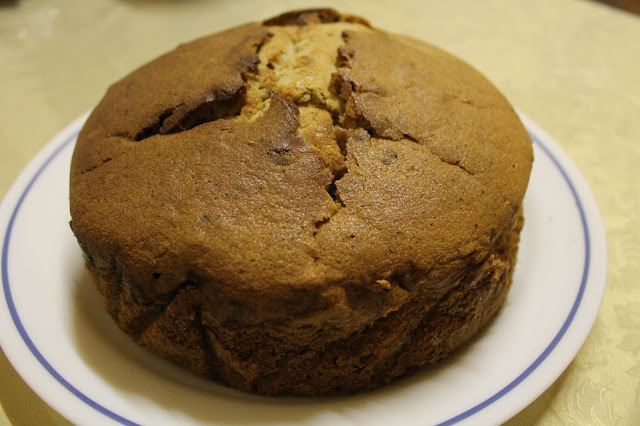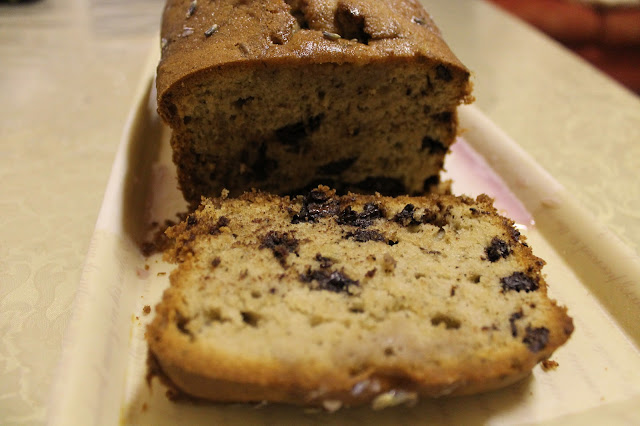This
flavour combination seemed so right at the time of conception.
I
love Earl Grey tea, I love dark chocolate and I like lavender. You would think combining them all would work
great, with the slight citrus and tea hint from the Earl Grey working well with
the dark chocolate, and the notes of floral aniseed from the lavender providing
an interesting contrast.
To
be honest the former pairing, I think, would have worked very well, and
initially that was what I intended to do for a long time, but in the process of
finding a cake base for what was initially going to be the ‘Earl Grey and Dark
Chocolate Chip Loaf Cake’, I came across this recipe called Lemon-Lavender
Pound Cake. When I saw the lavender
I instantly thought ‘hmmmm sounds good, let’s add that in too’.
Sometimes
less is more. I really should have stuck
with the initial concept because the cake was exceptionally lovely – so soft
and full in the mouth. A very satisfying
cake that was brought down with just too many flavours that I thought could
work together cohesively, but ended up sitting apart from each other completely.
I’m
talking specifically about the lavender.
I’ve cooked with lavender before where it was the sole flavour in some
cupcakes I made about a year ago. It
worked really well on its own as the main flavour, but when it is paired with
other flavours, lavender can become a bit of a problem. I think it’s because the flavour of lavender
is so unique, floral and prevalent that it risks drowning out all the other
flavours rather than complementing them in any way.
I’m
glad I only used 1 tbsp rather than the ⅓ cup specified in the recipe. I think that would just have killed the cake
completely!
I’m
curious though about making the original recipe. It looked so good in the picture that I’m
wondering if that amount worked well because it was paired with the lemon (a flavour that can hold it own). I’ve
seen this pairing before so maybe the lemon provides enough of a contrast to be
able to take such a hit of lavender.
Will need to try that out sometime.
 |
| Baked in the 7" round cake tin |
This
batter made a lot of cake with the recipe giving enough for two loaf tins. I used a 2lb loaf tin and 7” round cake tin
and I wouldn’t use anything smaller than that.
Like
I mentioned the cake itself was fantastic.
A soft but sturdy cake with a rich flavour (from all that butter no
doubt!) and delicious thick crust. I
will give the recipe as I made it but please think about omitting the lavender
completely or drastically reducing it further – maybe to about a ¼ tsp.
I
have to mention though that this cake really improved in flavour by the second
day. I don’t know how it did that but it
just did. The lavender just didn’t seem
as overwhelming when I tasted it the next day and the cake was just as soft and
scrummy. Maybe it had something to do
with the fact that it had cooled down a lot?
I’m not sure but I liked it much more and so did the family. So maybe this just needs time to develop its
flavours and you might want to give it a try with the lavender.
Earl
Grey, Lavender and Chocolate Chip Loaf Cake (adapted from Desserts for
Breakfast)
·
100ml milk infused with 3 teabags of Earl
Grey Tea (preferably overnight)
·
6 large eggs
·
1 tsp vanilla paste
·
450g plain flour
·
300g caster sugar
·
2 tsp baking powder
·
¼ tsp salt
·
1 teabag Earl Grey Tea cut open and
contents used only
·
375g butter, very soft
·
125g dark chocolate (60%), chopped small
(or chocolate chips if you have them)
·
1 tbsp lavender (seriously optional but
worth it on the second day)
Preheat
oven to 180C, prepare two loaf tins.
Combine milk, eggs and vanilla paste together in a measuring jug.
Combine
the flour, sugar, baking powder, salt and the loose Earl Grey from the teabag
and whisk carefully until mixed well.
Add
the softened butter to the flour mixture and beat until the mixture becomes
lighter and creamy.
Add
the milk mixture gradually to the flour/butter mixture, whisking thoroughly
after each addition.
Using
a spatula, mix in the lavender and chocolate, trying not to over mix now that
the flour has been incorporated.
Divide
the batter into the two loaf tins and bake for about 30 minutes then add a foil
cap on top of each loaf to prevent them from browning too much. I baked mine for an additional 25 minutes
before they both passed the skewer test.











No comments:
Post a Comment